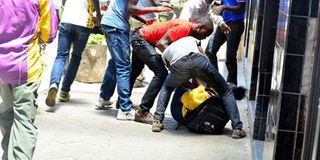Why exposé on gangs wreaking havoc in Nairobi is wrong in timing, location

Thugs descend on a pedestrian on a Nairobi street. PHOTO | FILE | NATION MEDIA GROUP
What you need to know:
- Crime is the reason given almost every decade since the 1990s, including this one, for the recurrent campaigns to relocate the UN Habitat from Nairobi.
- Crime has not just come to Nairobi’s Central Business District nor has the capital been hit by a sudden wave of it.
- Surprise at violent muggings in the CBD suggests that crime fits, belongs and resides in certain parts of the city and not others.
- The four pillars of President Kenyatta’s legacy namely work, health, infrastructure and housing will help reduce crime.
The current media-led narrative on organised crime gangs wreaking havoc in Nairobi is wrong on history, timing, location and reasons and, therefore, wrong on solutions.
One, the city’s nickname Nairobbery was coined in 1997. Then as now marauding gangs would pounce on tourists and locals alike and rob them of watches, wallets, jackets, cameras, jewellery, bags, name it.
I saw it happen to a group of tourists at the junction of Kimathi Street and Kenyatta Avenue shortly before 7 am.
Not long afterwards a normally fastidiously groomed colleague at Nation Centre turned up unkempt, his trousers shredded and rear exposed. He had been mugged at noon on neighbouring Moi Avenue.
Two, remember the TV expose of early 2000s that filled living rooms with stench? It featured prowling gangs using human waste as a weapon to force well-suited Nairobians wearing their best fragrances, to hand over their valuables throughout the day, day in and day out.
RELOCATE UN HABITAT
One Monday morning at 5.45 in 2015 as I walked to Nation Centre for a date with AM Live, a scream rent the air from the direction of the junction of Kenyatta Avenue and Moi Avenue. A gang had hurled a woman to the pavement and was violently robbing her.
Three, crime is the reason given almost every decade since the 1990s, including this one, for the recurrent campaigns to relocate the UN Habitat from Nairobi.
Therefore, crime has not just come to Nairobi’s Central Business District (CBD) nor has the capital been hit by a sudden wave of it. Pickpocketing, purse, bag, briefcase snatching and violent crime by organised gangs in Nairobi is a 24-hour all-year enterprise. Nobody, police in particular, should anymore be surprised by daylight robberies.
Surprise at violent muggings in the CBD suggests that crime fits, belongs and resides in certain parts of the city and not others. That attacks and offends the very essence of the Kenya Police Service exemplified in Utumishi kwa Wote (Service to All) motto.
CRIMINALS
That tells Kenyans they are on their own to be hunted, hounded and haunted by criminals. But, the prime duty of the government is to protect Kenyans and their property anywhere and at anytime. Failure here is devastatingly damning of the police and national government for it says there are certain parts of Kenya where criminals rule.
And the public is justified in questioning the effectiveness of police patrols and Closed Circuit Television surveillance (CCTV) in combating crime. But, patrols, weaponry and gadgetry will only deter criminals if they lead to investigations, accumulation of evidence and intelligence, arrests and successful prosecutions.
The law serves as a deterrent, and people respect the law and its enforcers, when it is indeed enforced. Unfortunately, most cases crumble in court because investigations by police often fall short. Unsurprisingly, the 2016 Economic Survey confirmed that police had been involved in 34 per cent (more than a third) of the crimes reported in 2015.
Who will the public turn to when the gang is in uniform? As I say, when police break the law there is no law. The public will not readily cooperate with a Service that will sooner stab them in the back than have their back against a robber or mugger?
NORMAL SERVICE
The Service would rather kill than grill and eliminate than investigate suspects. So the new gangs or old gangs under new or old leaders will disappear from view for a while and resume normal service after police have moved on.
But how effective are government’s anti-crime actions? In 2010 and 2016 it banned upwards of 40 criminal gangs. Some, among them Forty Brothers and Chinkororo twice. The former is the one said to be terrorising Nairobi now and, last October a minister confirmed the latter is still in business.
Last, to successfully fight crime government must answer these questions. Why work if crime pays? How do we stop unemployed millions from turning into criminals? Put another way, government must be tough on crime and tougher on its causes especially unemployment and poverty.
FOUR PILLARS
The four pillars of President Kenyatta’s legacy namely work, health, infrastructure and housing will help reduce crime. But crime could stop the pillars by keeping investors away. When banked money sees money in the purse snatched by criminal gangs, it either stays dormant or flees location or country altogether. However, ultimately, the best weapon against crime remains what Deputy President William Ruto promised on the campaign trail in 2012: double digit economic growth.
Opanga is a commentator with a bias for politics [email protected]





